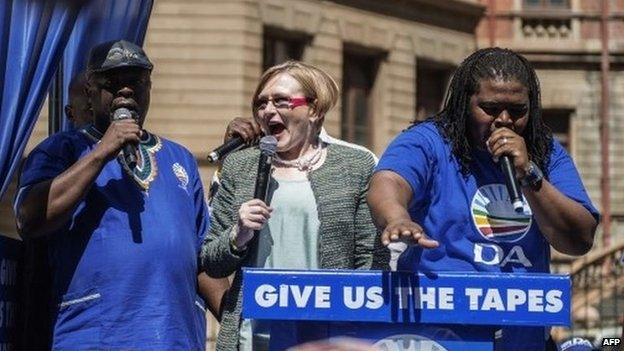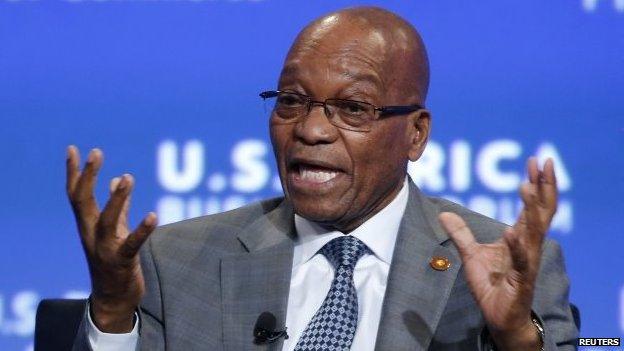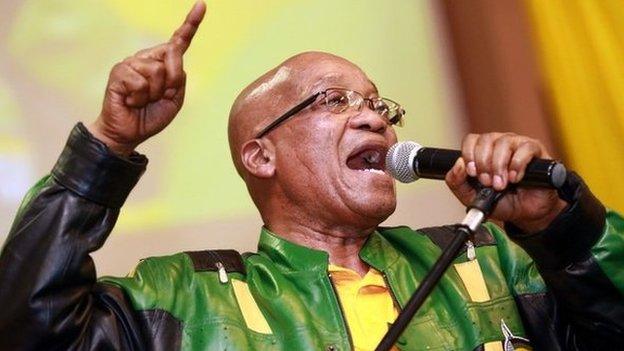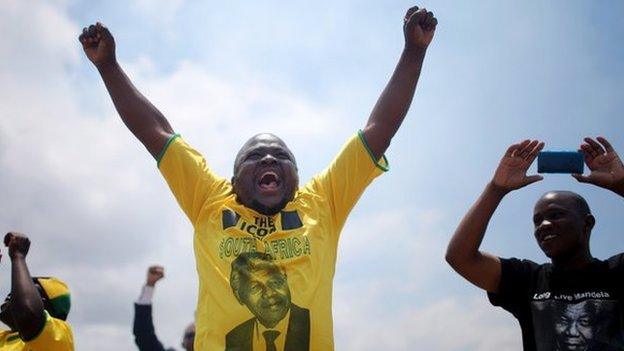Jacob Zuma 'spy tapes' given to South Africa's Helen Zille
- Published

Helen Zille has fought a five-year court battle to obtain the tapes
South Africa's opposition leader Helen Zille has been handed the "spy tapes" which she hopes will lead to corruption charges being reinstated against President Jacob Zuma.
The tapes formed the basis of a 2009 decision by prosecutors to drop the charges against Mr Zuma.
Ms Zille won a five-year legal battle to obtain the tapes to assess whether prosecutors had acted correctly.
Mr Zuma was accused of taking bribes in a multi-million dollar arms deal.
He denied the charges, insisting he was the victim of a "political conspiracy" hatched by his opponents in the governing African National Congress (ANC) to prevent him from becoming president.
He has said he welcomes the release of the tapes.

Jacob Zuma's corruption case:

1999: South Africa announces arms deal worth 30bn rand ($4bn; £2.5bn at current exchange rates) to modernise its defence forces - Zuma was ANC's deputy leader
2005: Sacked as deputy president and charged after his financial adviser Schabir Shaik was convicted of corruption over the deal
Charges come as Zuma is engaged in a power-struggle with President Thabo Mbeki
2006: Corruption case collapses
2007: Wins power-struggle, elected ANC president
Corruption charges reinstated shortly afterwards
6 April 2009: Prosecutors drop charges, saying new phone-tap evidence shows there was political involvement in decision to press charges
22 April 2009: ANC wins election and Zuma becomes president
2013: Commission of inquiry into arms deal opens
May 2014: Zuma re-elected

Ms Zille walked out of the High Court in the capital, Pretoria, with a "tamper evident security bag" containing transcripts of recordings and a memory stick.
"South Africa's democracy depends on this case. No-one is above the law," she told her supporters.
The handover followed a ruling by the Supreme Court of Appeal last week that the National Prosecuting Authority (NPA) should give the tapes to Ms Zille's Democratic Alliance (DA).
Intelligence officials allegedly intercepted telephonic conversations while Mr Zuma was being investigated by an elite anti-corruption unit known as the Scorpions.
The tapes were given to South Africa's then-chief prosecutor Mokotedi Mpshe.
He dropped the charges, saying the tapes proved there had been "political interference" in the case and Mr Zuma would be denied a fair trial.
Mr Mpshe's decision came just ahead of the 2009 elections.
The ANC won the elections, opening the way for Mr Zuma to become president.
He was re-elected earlier this year, retaining a huge majority in parliament.
- Published6 April 2018

- Published1 May 2014

- Published5 August 2013

- Published9 July 2024
